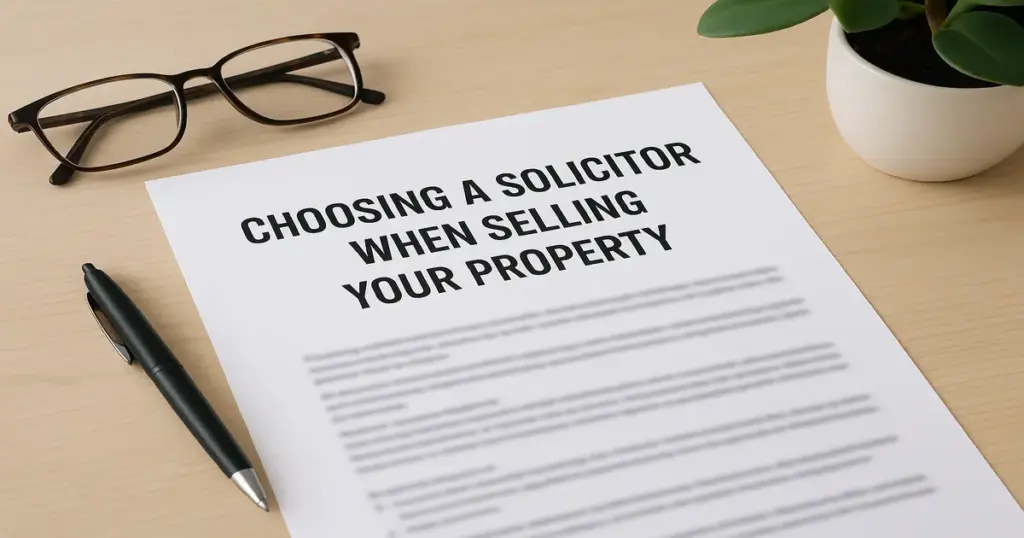What Type of Solicitor Do I Need When Selling My Property in the UK?
Selling a property is a significant undertaking involving many legal processes, documentation, and compliance checks. Choosing the right solicitor is one of the most crucial steps in ensuring a smooth and successful sale.
In the UK, the role of a solicitor (or conveyancer) in property sales cannot be overstated—they handle the legal transfer of ownership, liaise with the buyer’s representatives, and ensure all obligations are met.
This article explores the type of solicitor you need when selling your property in the UK, their responsibilities, how to choose the right one, and what to expect during the conveyancing process.
Understanding the Role of a Property Solicitor
When you decide to sell a property in the UK, you’ll need a legal professional to manage the sale’s administrative and legal aspects. This professional is usually a conveyancing solicitor or a licensed conveyancer.
What is Conveyancing?
Conveyancing refers to the legal process of transferring property ownership from one party to another. It includes tasks such as preparing contracts, conducting searches, liaising with mortgage lenders, and handling the exchange and completion of the sale.
Solicitor vs Licensed Conveyancer
- Solicitor: A solicitor is a fully qualified legal professional who can provide various legal services, including conveyancing, family law, probate, and more. They are regulated by the Solicitors Regulation Authority (SRA).
- Licensed Conveyancer: A licensed conveyancer specializes exclusively in property law and conveyancing and is regulated by the Council for Licensed Conveyancers (CLC).
Both can competently handle property sales, but the right choice for you depends on the complexity of your case and your personal preferences.
Do I Need a Solicitor or a Conveyancer?
A licensed conveyancer is often sufficient for straightforward property sales, such as selling a standard freehold house with no legal disputes or unusual issues. However, you may prefer a solicitor if your sale is more complex.
Situations Where a Solicitor Might Be Preferable:
- The property is part of a divorce or legal separation.
- There are disputes over property boundaries.
- The property is leasehold and has restrictive covenants or service charge complexities.
- You have a related probate or inheritance issue.
- There’s an ongoing legal dispute concerning the title or previous ownership.
Solicitors can provide broader legal advice and represent you if any unexpected legal complications arise during the transaction.
How to Choose the Right Solicitor
Experience and Specialisation
Look for a solicitor who specializes in residential property sales. Check how long they’ve been practising conveyancing and whether they have dealt with properties similar to yours.
Regulatory Credentials
Ensure your solicitor is registered with the Solicitors Regulation Authority (SRA) or, if using a licensed conveyancer, with the Council for Licensed Conveyancers (CLC). You can check their credentials on the respective websites.
Transparency on Fees
Solicitors charge in one of three ways:
- Fixed Fee: A set price regardless of the time it takes.
- Hourly Rate: You pay for the time they spend.
- Percentage Fee: Based on the value of the property.
Always ask for a complete quote that outlines all potential fees, including disbursements (e.g., bank transfer fees, ID verification, Land Registry costs).
Recommendations and Reviews
Ask friends, family, or your estate agent for recommendations. Online reviews can also provide insight into a solicitor’s reliability, communication, and efficiency.
Communication
You want a solicitor who is responsive and communicates clearly. Delays in communication can slow down your sale.
Use of Technology
Many modern solicitors offer online case tracking, e-signatures, and email communication. These features can make the process smoother and faster.
The Conveyancing Process for Sellers
Once you’ve appointed a solicitor, the conveyancing process begins. Here’s a step-by-step look at what to expect:
Step 1: Initial Instructions
Your solicitor will ask you to complete several forms, including:
- Property Information Form (TA6)
- Fittings and Contents Form (TA10)
- Leasehold Information Form (TA7) (if applicable)
You’ll also need to provide ID and proof of ownership.
Step 2: Drafting the Contract
Your solicitor will use the information you’ve provided to draft a contract for the buyer’s solicitor. This includes title deeds, planning permissions, and property boundaries.
Step 3: Responding to Enquiries
The buyer’s solicitor will raise pre-contract enquiries. Your solicitor will liaise with you to respond to these, clarifying issues like rights of way, service charges, or alterations to the property.
Step 4: Agreeing on a Completion Date
Once both sides are satisfied, the solicitors will agree on a completion date—when you move out, and the buyer moves in.
Step 5: Exchange of Contracts
This is the point at which the transaction becomes legally binding. You’ll sign the contract, and your solicitor will exchange it with the buyer’s solicitor.
Step 6: Completion
Upon completion, your solicitor receives the buyer’s funds and repays your mortgage (if applicable). They then confirm receipt of funds, and the keys are released.
Costs Involved
While your estate agent’s fees are usually the biggest, solicitor fees are significant too. Expect to pay anywhere from £500 to £1,500, depending on the complexity of the transaction and the solicitor’s fee structure.
Disbursements such as title deeds (£25–£100), bank transfer fees (£20–£50), and ID checks may also apply.
Common Pitfalls When Choosing a Solicitor
Going for the Cheapest Option
Cheap conveyancing might save money upfront, but could lead to delays or poor service. Always weigh price against service quality.
Poor Communication
Unresponsive solicitors can cause deals to fall through—Prioritise firms known for timely updates.
Hidden Costs
Some firms offer attractive quotes but add hidden charges later. Ask for a fully itemized quote from the start.
Lack of Experience
A general practice solicitor may not be up-to-date on property law. Always choose someone who regularly handles property sales.
FAQs
Q: Can I sell my house without a solicitor?
Technically, yes, but it’s not recommended. Selling a house involves complex legal work, and a mistake can cost thousands in future disputes or failed sales.
Q: When should I instruct a solicitor?
You should instruct a solicitor when your property goes on the market. This ensures they’re ready to act when you accept an offer.
Q: What’s the difference between leasehold and freehold?
A freehold property means you own the property and the land. A leasehold means owning the property for a fixed term, not the land. Leasehold sales are more complex and may require more legal work.
Q: Do I need a local solicitor?
Not necessarily. Many solicitors operate nationwide. While some prefer a local firm for face-to-face meetings, others are happy to work remotely via email and phone.
Q: How long does the conveyancing process take?
On average, 8–12 weeks from offer acceptance to completion. However, this can vary based on property type, buyer readiness, and chain complexity.
Q: What documents do I need to provide?
- Proof of ID
- Title deeds
- Property information forms (TA6, TA10, TA7 if leasehold)
- Warranties for appliances or recent building work
- EPC (Energy Performance Certificate)
Q: Can I use the same solicitor as my buyer?
This is possible, but not always advisable due to potential conflicts of interest. Some firms have systems to manage this, but in most cases, separate representation is safer.
Q: What if my sale falls through?
You won’t complete the transaction if the sale falls through before the exchange. You may still owe fees for work already done, so ask your solicitor about their policy on abortive transactions.
Q: Can a solicitor speed up the process?
A proactive and well-organized solicitor can significantly reduce delays. Look for someone experienced, responsive, and using technology to streamline processes.
Q: Should I let my estate agent recommend a solicitor?
Estate agents often have referral arrangements with solicitors. These recommendations can be helpful, but don’t choose unthinkingly—research the firm independently and compare with others.
Final Thoughts
Choosing the right solicitor when selling your property in the UK can make the difference between a smooth, efficient process and a stressful, delayed transaction.
A licensed conveyancer may suffice for most straightforward sales, but if there’s any complexity involved—leasehold, probate, disputes—a full-service solicitor is your best bet.
Always prioritize experience, transparency, and communication when selecting a solicitor. Although it may cost more upfront, the peace of mind and legal security are well worth the investment.
Whether selling a cosy flat in London or a countryside cottage in Yorkshire, having a skilled and diligent solicitor on your side ensures your sale proceeds with clarity and confidence.
Regulators & Official Directories
Solicitors Regulation Authority (SRA) – Check a Solicitor
Use this to verify if a solicitor is regulated and in good standing.
Council for Licensed Conveyancers (CLC) – Find a Conveyancer
Find licensed property specialists regulated by the CLC.
The Law Society – Find a Solicitor
Directory of SRA-regulated solicitors with filters for location and specialism (e.g., conveyancing).
Step-by-step official government guide for homeowners.
Read our top Blogs:
Sell My Property Fast For Cash In Wandsworth
What to Do If Your House Won’t Sell: Fast Solutions That Work
How to Sell House Fast: Proven Tips to Get a Quick Sale Without Estate Agents
Call +447702210159 our friendly team for a same-day offer





